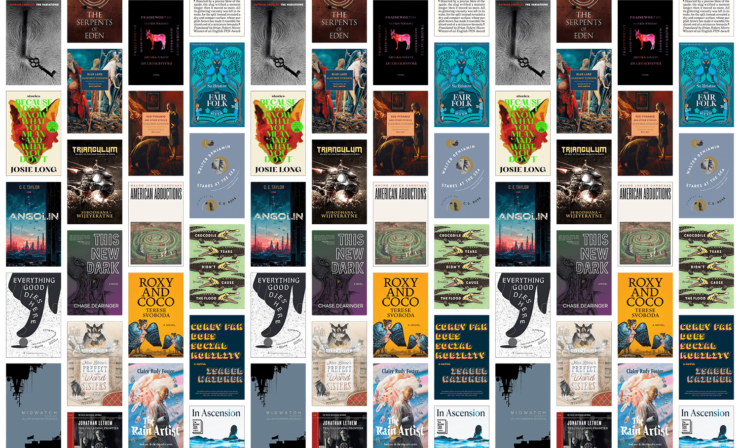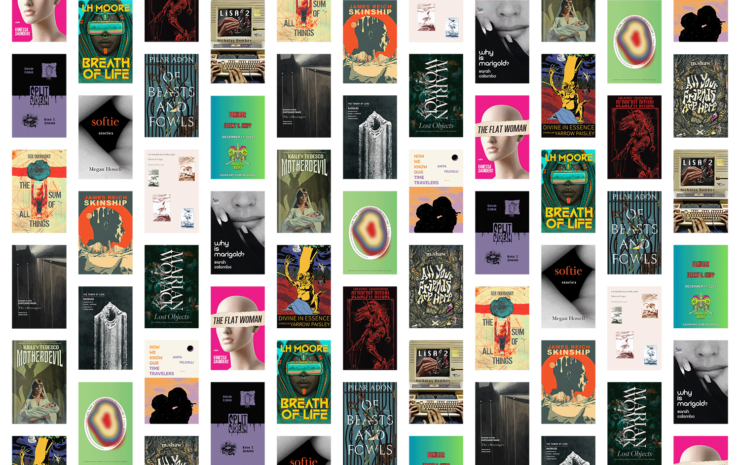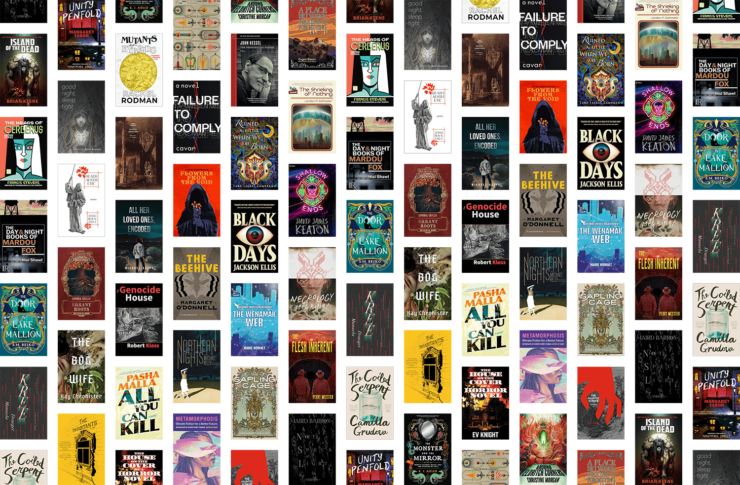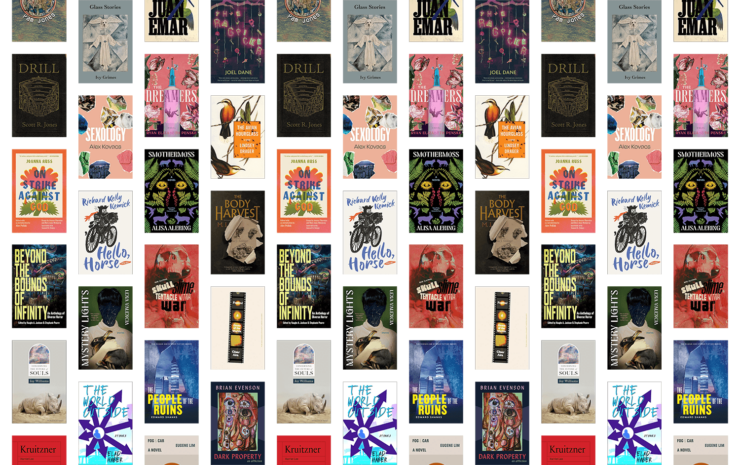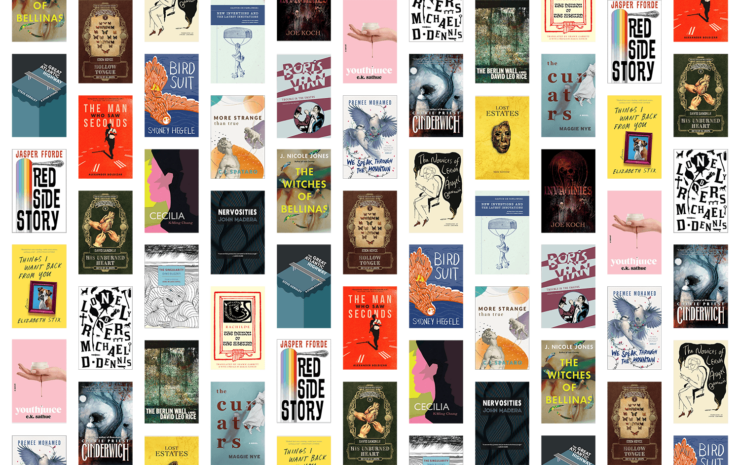Somehow Palpatine returned, only in this scenario the role of “Palpatine returned” will be played by “it’s 2024.” I’m as surprised as you are; I still have to remind myself to write “2023” on my checks, which suggests that I’m likely to fall two years off on at least one piece of correspondence. I wish I could say that this was some sort of uncanny slippage through time, like in a Steve Erickson novel; it’s not.
On the plus side, at least the first two months of 2024 have some promising-looking books due out from indie presses.
Here’s a look at a number of them, from satirical science fiction to tales of mythological creatures working 9-to-5 jobs. (I should probably also mention here that I have a speculative-adjacent short novel of my own due out in February.) Here’s a look at what the new year has in store.
File Under: Haunted Landscapes
Critically acclaimed author Alexis Wright has won multiple awards for her fiction and nonfiction alike; writing in these pages in 2016, Alex Brown called Wright’s The Swan Book “at once uniquely Indigenous and Australian, a masterpiece of Australian apocalyptic fiction and a bone-jarring stroke of Aboriginal narrative.” Her new novel Praiseworthy will be released in the U.S. in January, and it follows the arrival of a bizarre cloud on a small community in northern Australia. And if this review is any indication, it appears to be about…everything. (New Directions; Feb. 6, 2024)
When a girl goes missing from an Oklahoma town, strange happenings become more and more widespread. That’s the concept at the heart of Chase Dearinger’s debut novel This New Dark, about a disparate cast of characters dealing with a disruption to their community and the potential arrival of a supernatural evil on the scene. (Belle Point Press; Feb. 20, 2024)
File Under: Earthbound Futures
In a 2021 interview, Mauro Javier Cárdenas shared some details about his third novel American Abductions—including the presence of a robotic nurse within the text. In this novel, Cárdenas chronicles the struggles of immigrants in a near-future U.S.—one where authoritarian abuses of power and unchecked surveillance make everyday experiences that much more challenging. (Dalkey Archive Press; Feb. 13, 2024)
What would it be like to live in a future in which rain was an exclusive commodity? That’s among the details of the setting of Claire Rudy Foster’s novel The Rain Artist, which is billed as the first book in the Clepsydra Series. (Possibly relevant here: “clepsydra” is a synonym for “water clock.”) It’s also an expansion of Foster’s acclaimed short story. (Moonstruck Books; Feb. 24,. 2024)
Vladimir Sorokin’s fiction has given readers everything from bizarre cults to one of the weirdest zombie narratives you’re likely to read. 2024 sees the release of his 1999 novel Blue Lard in an English translation, courtesy of Max Lawton. This one has parallel timelines, cloned Russian writers, and weird energy sources; it’s a novel that helped establish Sorokin as a vital and transgressive author. (NYRB Classics; Feb. 27, 2024)
File Under: Spacefaring Futures
What happens when ancient writings are reimagined for the distant future? In a 2017 interview, Subodhana Wijeyeratne discussed his then-upcoming novel Triangulum, saying “I’ve always wanted to combine the cryptic metaphysics of texts like the Rig Veda with a sort of dark sci-fi aesthetic.” With this tale of empires spanning the cosmos and gods going to war, he’s created a singular vision of the future. (Rosarium; Jan. 16, 2024)
Longlisted for the 2023 Booker Prize, Martin MacInnes’s expansive novel In Ascension will be available to readers in the United States in February. The novel follows a scientist recruited for a mission deep into the solar system to explore the origins of life on Earth. Reviewing it for The Scotsman, Stuart Kelly referenced the Fermi Paradox and Out Of The Silent Planet, adding, ”The novel’s intellectual daring is formidable.” (Black Cat Press; Feb. 27, 2024)
There’s a long tradition of science fiction that offers its characters difficult moral choices in the face of overwhelming odds. C.E. Taylor’s novel Angolin—which looks to be the first book in a trilogy—does precisely that, giving its protagonist an invasion and a potential coup to reckon with in a distant, technologically advanced future. (CamCat Books; Feb. 13, 2024)
File Under: The Mythological
This winter sees the latest installment of Olga Wojtas’s chronicle of a librarian whose work takes her across time and space, often in inexplicable ways. That this new volume is titled Miss Blaine’s Prefect and the Weird Sisters should offer a sense of what else might be on the menu this time around: think the Scottish play, and all the witchcraft that that implies. (Felony & Mayhem; January 2024)
If you’ve read enough stories involving the fae, you’re probably aware of the hazards of striking bargains with the eldritch beings in question. The actual inhabitants of those stories don’t have the same warnings, alas—and as the protagonist of Su Bristow’s novel The Fair Folk learns, the consequences of a deal struck in childhood can echo throughout one’s life. (Europa Editions; January 2024)
Terese Svoboda described her novel Roxy and Coco as being “about two harpies-turned-social-workers who now and then off abusive parents” in a recent interview. Svoboda’s writing has often left realism behind and ventured into the fantastical; among others, 2010’s Pirate Talk or Mermalade featured a mermaid among the cast of characters. This new novel looks to be an irreverent, unpredictable jaunt into both the mythical and quotidian. (West Virginia University Press; February 2024)
File Under: Break Down the (Genre) Walls
One advance review of C.D. Rose’s collection Walter Benjamin Stares at the Sea made comparisons between its stories and the work of Jorge Luis Borges and Aimee Bender. That’s promising company to be in—and the dreamlike and sometimes metafictional work on display here makes for a welcome addition to the world of shortform surrealism. (Melville House; Jan. 23, 2024)
In 2021, Alex Pheby wrote of Isabel Waidner in these very pages, “Their work is a dizzying mix of genre-defying word play, queer/trans experience, literary experiment and – often overlooked – fun.” Waidner’s new book Corey Fah Does Social Mobility features time loops, wormholes, and a literary trophy that behaves like a UFO—all things that pique my interest dramatically. (Graywolf Press; Feb. 6, 2024)
Translator Brian Robert Moore has described Michele Mari’s Verdigris as being among Mari’s “most personal and horror-inflected novels.” It’s a coming-of-age novel in which monsters both human and uncanny make appearances, where one character can hear the dead, and where the solutions to certain mysteries may reveal even greater terrors lurking beneath. (And Other Stories; Jan. 2, 2024)
File Under: Uncanny Abilities
Some familial legacies involve possessions, feuds, or debts. In Patrick Langley’s novel The Variations, the debt passed down across generations involves being able to hear voices from the past. The Guardian’s review noted that this novel “takes place in a world that looks very much like our own but feels alien and strange, as if brushed by the supernatural.” It also features a location by the name of Agnes’s Hospice for Acoustically Gifted Children, which sounds especially intriguing. (New York Review Books; Feb. 20, 2024)
An artist begins a dangerous journey through parallel worlds after supernatural beings kidnap his grandson. That’s the concept at the center of RW Goldsmith’s novel The Serpents of Eden, which brings together an unexpected combination of elements with a propulsive narrative. Also, the author’s bio alludes to time spent in a “California wild-west re-enactment troupe.” As literary origin stories go, that one’s hard to beat. (Running Wild Press; Jan. 8, 2024)
File Under: Short Fiction, Collected
Maybe you enjoyed Djuna’s novel Counterweight when it was released in an English translation in the summer of 2023. Maybe you’re just looking to read a compelling selection of short fiction. Either way, Everything Good Dies Here, translated by Adrian Thieret, offers readers a fine overview of Djuna’s work. Also, this line from a Clarkesworld interview is especially tantalizing: “Joanna Russ, R. A. Lafferty, and James Tiptree Jr. are the writers I looked up to most when I really started writing short stories in full swing.” (Kaya; February 2024)
In 2021, Bradley Sides described his first collection as “a book of magical realism and weird fiction stories that looks and lives in spaces we all know but can probably not always describe.” In February he’ll return with a second collection, Crocodile Tears Didn’t Cause the Flood, that takes things even further in an uncanny and fantastical direction. These stories are populated by vampires, dragons, and apocalyptic moods; it’s a memorable statement of Sides’s own fictional concerns. (Montag Press; Feb. 24, 2024)
Full disclosure: I’ve been reading Jonathan Lethem consistently for longer than almost any other author, beginning with his stories that saw publication in Asimov’s Science Fiction Magazine. Needless to say, I’m thrilled to see him contributing to PM Press’s Outspoken Authors series; The Collapsing Frontier brings together several short stories of his along with an interview, and should be a welcome addition to an already-impressive bibliography. (PM Press; Feb. 27, 2024)
Turns out Blue Lard isn’t the only book of Vladimir Sorokin’s seeing release in an English translation this winter. His Red Pyramid and Other Stories offers a selection of his short stories, which encompass modes of horror, speculative fiction, and satire—and sometimes all of the above at once. (NYRB Classics; Feb. 27, 2024)
Publisher Split Lip Press describes Jillian Danback-McGhan’s collection Midwatch as blending “military literature and feminist horror.” That’s not a combination you hear every day, and it’s definitely caught my eye. The author’s own background as a Navy veteran suggests a detailed knowledge of these settings and spaces, and the description of what’s inside sounds both emotionally harrowing and more than a little uncanny. (Split Lip Press; Feb. 6, 2024)
The debut collection from writer and comedian Josie Long, Because I Don’t Know What You Mean and What You Don’t, balances an array of styles and moods—including invocations of witchcraft and a foray into the apocalyptic. Long described the stories by saying, “Some are about how rigged the country is, some are about romance, some are about climate change.” In the same interview, she also stated her admiration for the stories of Kelly Link and Leonora Carrington, which is encouraging as well. (Canongate; Feb. 13, 2024)
Tobias Carroll is the managing editor of Vol.1 Brooklyn. He is the author of the short story collection Transitory (Civil Coping Mechanisms) and the novel Reel (Rare Bird Books).










